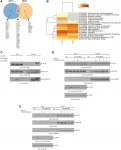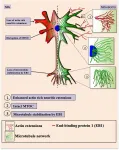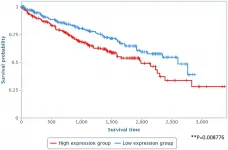Addressing social needs may help mitigate distress and improve the health of women with cancer
2021-07-12
(Press-News.org) A new study published by Wiley early online in CANCER, a peer-reviewed journal of the American Cancer Society, has identified unmet social needs in women with gynecologic cancer that could be addressed to improve care for patients and lessen disparities. For example, identifying patients who reported needing help with reading hospital materials resulted in the use of a cancer care navigator who provided patient education and support, facilitating physician-patient communication and adherence to care recommendations.
The prospective survey-based study conducted at Olive View-UCLA Medical Center, a public safety net hospital near Los Angeles, included 135 women, many of whom were immigrants and living below the federal poverty level. Nearly two-thirds (65.2%) of patients had at least one unmet social need (the lack of a basic resource), and 37.8% of patients screened positive for psychological distress. Help with reading hospital materials was the most frequently reported need (30.4%). Needing someone to talk to, social isolation, housing instability, financial toxicity, food insecurity, and transportation difficulties were also prevalent.
"While it is not within the power of individual healthcare systems or providers to modify social determinants of health, these data offer hope that we can implement programs to reduce healthcare disparities by addressing unmet social needs," said senior author Abdulrahman K. Sinno, MD, of the Sylvester Comprehensive Cancer Center at the University of Miami Miller School of Medicine. "It's important that we focus on addressing social needs regardless of the social, economic, and political inequities that precede them because these needs are ultimately downstream mediators of poor health outcomes."
In addition to using cancer care navigators to help with reading hospital materials, other social needs such as food insecurity, housing instability, and lack of transportation were addressed by connecting patients with available resources. These resources include Meals on Wheels America, Project Angel Food, county-sponsored housing programs, and transportation assistance programs. Furthermore, for patients who screened positive for distress, a social worker with mental health specialization and a psychiatry team were embedded into the clinic to remove barriers to mental healthcare.
"In the future, we plan to demonstrate the utility and cost effectiveness of identified social need intervention algorithms not only for improving quality of life and health outcomes, but also for reducing healthcare disparities," said Dr. Sinno.
INFORMATION:
Additional Information
NOTE: The information contained in this release is protected by copyright. Please include journal attribution in all coverage. A free abstract of this article will be available via the Cancer News Room upon online publication. For more information or to obtain a PDF of any study, please contact:
Dawn Peters +1 781-388-8408 (US)
newsroom@wiley.com
Follow us on Twitter @WileyNews
Full Citation:
"Universal social needs assessment in gynecologic oncology: An important step towards more informed and targeted care in the public safety net." Natsai C. Nyakudarika, Christine H. Holschneider, and Abdulrahman K. Sinno. CANCER; Published Online: July 12, 2021 (DOI: 10.1002/cncr.33761).
URL Upon Publication: http://doi.wiley.com/10.1002/cncr.33761
Author Contact: Ann Keil Dux, Communications and Media Relations Director at Sylvester Comprehensive Cancer Center at AnnDux@med.miami.edu
About the Journal
CANCER is a peer-reviewed publication of the American Cancer Society integrating scientific information from worldwide sources for all oncologic specialties. The objective of CANCER is to provide an interdisciplinary forum for the exchange of information among oncologic disciplines concerned with the etiology, course, and treatment of human cancer. CANCER is published on behalf of the American Cancer Society by Wiley and can be accessed online.
Follow us on Twitter @JournalCancer
About Wiley
Wiley is a global leader in research and education, unlocking human potential by enabling discovery, powering education, and shaping workforces. For over 200 years, Wiley has fueled the world's knowledge ecosystem. Today, our high-impact content, platforms, and services help researchers, learners, institutions, and corporations achieve their goals in an ever-changing world. Visit us at Wiley.com, like us on Facebook and follow us on Twitter and LinkedIn.
ELSE PRESS RELEASES FROM THIS DATE:
2021-07-12
Oncotarget published "Inhibitory effects of Tomivosertib in acute myeloid leukemia" which reported that the authors evaluated the therapeutic potential of the highly-selective MNK1/2 inhibitor Tomivosertib on AML cells.
Tomivosertib was highly effective at blocking eIF4E phosphorylation on serine 209 in AML cells.
Moreover, combination of Tomivosertib and Venetoclax resulted in synergistic anti-leukemic responses in AML cell lines.
Mass spectrometry studies identified novel putative MNK1/2 interactors, while in parallel studies we demonstrated that MNK2 - RAPTOR - mTOR complexes are not disrupted by Tomivosertib.
Overall, these Oncotarget findings demonstrate that Tomivosertib exhibits potent ...
2021-07-12
Oncotarget published "Epigallocatechin-3-gallate modulates Tau Post-translational modifications and cytoskeletal network" which reported that the chemical modulators of Tau PTMs, such as kinase inhibitors and antibody-based therapeutics, have been developed, but natural compounds, as modulators of Tau PTMs are not much explored.
These authors applied biophysical and biochemical techniques like fluorescence kinetics, oligomerization analysis and transmission electron microscopy to investigate the impact of EGCG on Tau glycation in vitro.
EGCG inhibited methyl glyoxal -induced Tau glycation in vitro.
EGCG potently inhibited MG-induced advanced glycation endproducts formation in neuroblastoma cells as well modulated the localization ...
2021-07-12
Oncotarget published "A novel E2F1-regulated lncRNA, LAPAS1, is required for S phase progression and cell proliferation" which reported that long non-coding RNAs are major regulators of many cellular processes, including cell cycle progression and cell proliferation.
Inhibition of LAPAS1 expression increases the percentage of S phase cells, and its silencing in synchronized cells delays their progression through S phase.
In agreement with its suggested role in cell cycle progression, prolonged inhibition of LAPAS1 attenuates proliferation of human cancer cells.
Importantly, knockdown of SPNS2 rescues the effect of LAPAS1 silencing on cell cycle ...
2021-07-12
Imagine sitting out in the sun, reading a digital screen as thin as paper, but seeing the same image quality as if you were indoors. Thanks to research from Chalmers University of Technology, Sweden, it could soon be a reality. A new type of reflective screen - sometimes described as 'electronic paper' - offers optimal colour display, while using ambient light to keep energy consumption to a minimum.
Traditional digital screens use a backlight to illuminate the text or images displayed upon them. This is fine indoors, but we've all experienced the difficulties of viewing such screens in bright sunshine. Reflective screens, however, attempt to use the ambient light, mimicking the way our eyes ...
2021-07-12
Researchers have identified a specialized protein that appears to help prevent tumor cells from entering the bloodstream and spreading to other parts of the body.
"We have discovered that this protein, TRPM7, senses the pressure of fluid flowing in the circulation and stops the cells from spreading through the vascular system," said Kaustav Bera, a Johns Hopkins University PhD candidate in chemical and biomolecular engineering and a lead author of the study, which was done with colleagues at the University of Alberta and Universitat Pompeu Fabra.
"We found that metastatic tumor cells have markedly reduced levels of this sensor protein, and that is why they ...
2021-07-12
Men over 60 with low-risk prostate cancer could spend ten years with no active treatment, have a better sex life as a result, yet still be very unlikely to die from the disease, new research has found.
The findings come from two new studies looking at 'active surveillance' of prostate cancer - when the disease is closely monitored but not treated - presented at the European Association of Urology congress, EAU21, today.
The first uses data from Sweden's National Prostate Cancer Register, which has information on virtually every man diagnosed with the disease in that country since 1998 - 23,649 of whom went on active surveillance. ...
2021-07-12
Care homes need to be vigilant for outbreaks of COVID-19, even after residents have received two doses of the vaccine, according to new research being presented at the European Congress of Clinical Microbiology & Infectious Diseases (ECCMID) held online this year.
Long-term care facilities, such as care homes with elderly residents with multiple underlying conditions, are at high risk of COVID-19 outbreaks and many vaccination campaigns have initially focused on care home residents and the staff looking after them. An outbreak in a French care home, however, raises questions about how effective the vaccine is in the elderly.
Martin Martinot, of ...
2021-07-12
COVID-19 outbreaks in French nursing homes almost certainly started in staff - and none of measures put in place stopped the virus from taking hold, new research being presented at the European Congress of Clinical Microbiology & Infectious Diseases (ECCMID), held online this year, shows.
Residents of long-term care facilities represent a small fraction of the general population but account for a disproportionate number of SARS-CoV-2-related deaths in many countries.
In France, 5,203 outbreaks (of 1 case or more) were reported in nursing homes during the first wave of COVID-19. In the Auvergne-Rhône-Alpes region, there were 651 outbreaks, 3,885 residents had confirmed COVID-19 infection and 1,772 ...
2021-07-12
The flu vaccine may provide vital protection against COVID-19, new research being presented at the European Congress of Clinical Microbiology & Infectious Diseases (ECCMID), held online this year, concludes.
An analysis of patient data from around the world strongly suggests that the annual flu shot reduces the risk of stroke, sepsis and DVT in patients with COVID-19. Patients with COVID-19 who had been vaccinated against flu were also less likely to visit the emergency department and be admitted to the intensive care unit (ICU).
Immunising the world against COVID-19 is a daunting challenge and, although production and distribution of vaccines increases daily, some countries are not expected to vaccinate large numbers of their population ...
2021-07-12
A vaccine to protect against infection with hepatitis C could be in use within 5 years, says Professor Sir Michael Houghton, who won the Nobel Prize for Medicine and Physiology along with three other scientists for discovering the hepatitis C virus (HCV) in 1989. Sir Michael will discuss the development of a vaccine in a special presentation at this year's European Congress of Clinical Microbiology and Infectious Diseases (ECCMID), held online this year.
Up to 2 million new HCV infections occur every year around the world, with an estimated 70 million carriers of the virus globally, most of whom are not diagnosed. The virus is estimated to cause some 400,000 deaths annually. Many infected with the virus go on to develop liver cirrhosis and liver cancer.
"While the advent of ...
LAST 30 PRESS RELEASES:
[Press-News.org] Addressing social needs may help mitigate distress and improve the health of women with cancer



